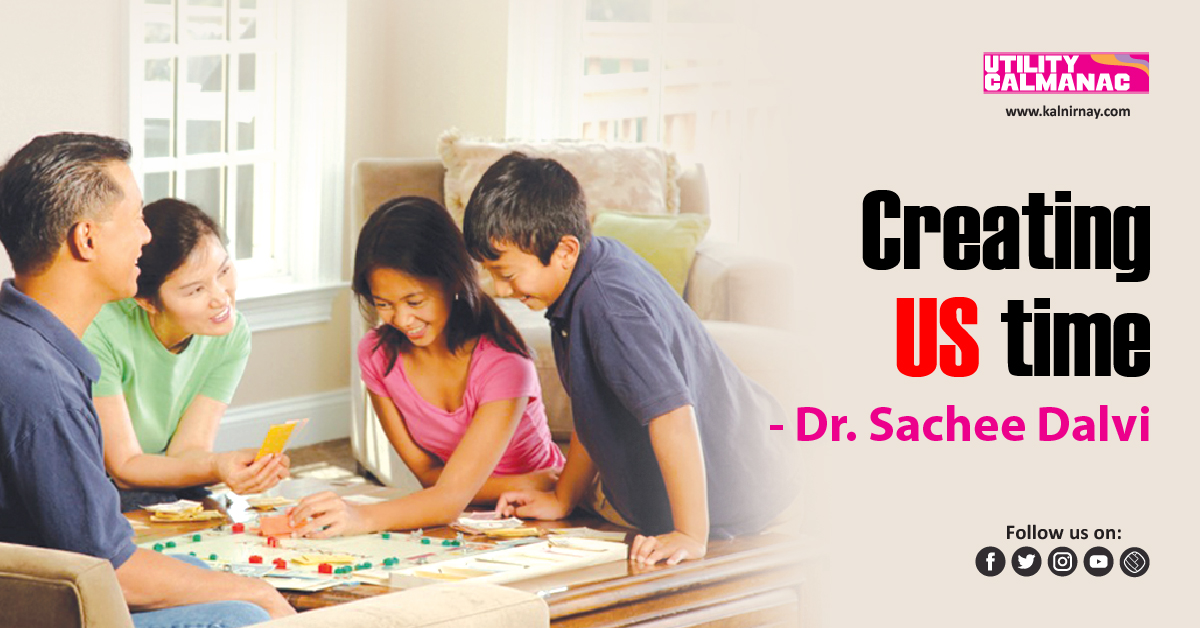Creating “US” time
With a little planning, parents can create meaning in the time they spend with their kids
Childhood is a crucial time in a person’s life. It has a monumental impact on who one will grow up to be, the way a person feels and acts like an adult. Parent-child dynamics are known to be the foundation of future relationships and a source of earliest consciousness about love, intimacy, trust and security.
Studies show that increased parental involvement is good for a child’s health and development, academic progress, and life choices. Children often communicate their needs in a ‘subtle’ manner. Some children simply withdraw while others ‘act out’ when they feel they aren’t getting enough attention. When a child fights with a friend or a classmate or resorts to behaviours that would have gotten his/her parent’s attention in the past-like increased crying, tantrums or even bed-wetting. it is most often a cry for attention. Realistically speaking, no parent can provide love, attention and warmth every minute of every day. However, with a little effort and some quality time, a parent can build a wholesome relationship with the child over a period of time.
It might become easier to fit in some fun activities and conversations on a regular basis if you put in a little thought. These moments will be their opportunity to learn from you, be heard and connect with you. Some ways to carve in quality time are:
One-on-one time:
Parents should individually spend at least an hour with each child. Working parents may try to compensate by spending longer time over the weekends. During this time, the parent has to really listen. Hold back suggestions, corrections, criticism and comments. Just allow the child to express themselves. Ask them more questions, be there for your child. Once they feel like they’re being heard, children tend to open up.
Physical Affection: Parents should hug their children often. If a child wants to hug or cuddle, give in, no matter how busy you are. Hugging is known to reduce stress and promote good health. It also allows the child to understand that when they need them, their parents will be there.
Have fun together:
If you plan activities that both you and your child can enjoy, it will enhance the quality of the time you spend together. Find out what your child is interested in, Try and plan an activity around it. For eg, if your child enjoys painting, find a colouring book for both of you to colour together in. Ask your child if they might like to join you for a walk or pick a jigsaw puzzle to finish. You could also play a sport together. Movie nights, board games, playing musical instruments, singing or listening to music together are some other ideas to get you started. Allowing the children to pick the activity for family time will give them a sense of ownership and independence. It will also be a way to understand your children better.
Mealtimes:
Eating together helps strengthen the family bond. Make sure all gadgets are off so that the table becomes a place of conversation. For working parents, eating every meal together may not be possible, but eating at least one meal a day with the family. Conversations can start with sharing how each person’s day was. The family can discuss news, the latest inventions, sporting events or even talk about what activity needs to be planned for the next family activity slot. Encourage children to talk about school, their friends, their teachers. Ask them questions about their daily activities. You can involve them more by getting them to help you cook/assemble the meal. Cooking together is also known to be therapeutic. Get them to help you lay the table, heat the food. All family members can divide the chores so they get done faster, and you get to spend some more time together.
Play: Right from infancy and toddler years, playtime is known to be a source of learning and development. As kids grow older, they tend to become more independent and may not play with their parents as much. But it is a wonderful way to destress. Play can include anything — antakshari, board games or even dancing. Parents of younger kids should build forts, create play-dough animals, run a make-believe restaurant — the ideas are endless. Older children might want to be on their own, but still, encourage them to step out and play with you.
The pandemic gave children unlimited access to their parents at home, however, with work from home and increased household chores, the quality of time spent together was naturally impacted. It is important to let your children know that they are important to you. They have to know that no matter how busy you are if it is important to them, you’ll make time. With proper communication and through open conversation, you can set some basic boundaries. However, check-in with them often. Understand what they may need for their online school and prepare in advance. Children may have unknowingly absorbed some of their parents’ stress too. They have been away from school and from their friends for the larger part of the last two years. If your child has a problem, you may not be able to solve it, but for them to know that you are involved enough to listen is deeply comforting.
Don’t forget to tell your children how wonderful they are and don’t shy away from applauding their good deeds. Knowing that they are loved and that they made their parents proud is what truly makes a child happy.
And a happy child is the foundation of a good human being. Enjoy watching these tiny tots grow into capable young minds.
To read more English blogs, visit our blog section.
Dr Sachee Dalvi
The author is a woman and child psychologist.

